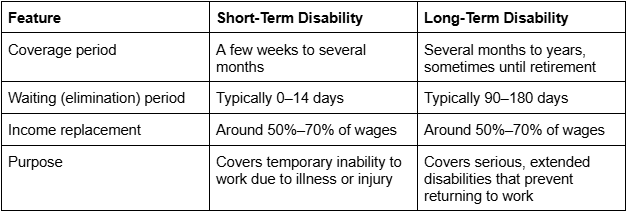What is long-term disability?
Long-term disability (LTD) insurance is a type of coverage that provides income replacement for employees who are unable to work for an extended period due to serious illness or injury. Unlike short-term disability, which typically covers weeks or a few months, long-term disability benefits can last for several years—or even until retirement—depending on the plan.
For small business owners, offering long-term disability coverage as part of your benefits package can be a meaningful way to support your team’s financial security and well-being. While not always legally required, providing this option shows your employees that you’re committed to their long-term health and stability.
How long-term disability insurance works
Long-term disability insurance kicks in after an employee has been unable to work for a specific waiting period—usually after short-term disability benefits have been exhausted. Depending on the policy, LTD can replace between 50% and 70% of the employee’s regular income.
Key features of long-term disability plans include:
- Elimination period: The waiting time before benefits begin (often 90 to 180 days)
- Benefit amount: A percentage of the employee’s salary that will be paid during the disability period
- Benefit duration: How long payments continue (e.g., two years, five years, until retirement age)
- Definition of disability: Specifies what qualifies as a disabling condition under the policy
Some plans cover both physical and mental health conditions, while others may have limitations on certain diagnoses.
Why you may want to offer long-term disability coverage to your employees
While not as commonly offered as health insurance or paid time off, long-term disability coverage can provide valuable peace of mind for your employees. Here’s why it matters:
- Protects your team from financial hardship: Serious health issues can cause long-term income loss; disability coverage helps employees stay afloat.
- Improves employee retention and loyalty: Benefits like LTD show your team you care about their long-term security.
- Enhances your employer brand: Offering competitive benefits helps you attract and retain skilled workers, especially in competitive labor markets.
- Supports compliance with local laws (where applicable): Some states may have disability-related requirements for certain industries or business sizes.
For small businesses, especially in industries where physical labor is involved, LTD coverage can be an important safeguard.
What long-term disability typically covers
Conditions that may be covered by long-term disability insurance include:
- Serious injuries (like back injuries, fractures, or severe sprains)
- Chronic illnesses (such as cancer, multiple sclerosis, or heart disease)
- Mental health conditions (in some policies), including severe depression or anxiety
- Disabling surgeries with extended recovery periods
It’s important to review the specific details of your policy because exclusions and definitions of disability can vary between providers.
Employer responsibilities for long-term disability coverage
If your business offers LTD insurance, your responsibilities may include:
- Selecting and negotiating plan options with an insurance provider
- Sharing plan details and eligibility requirements with your employees
- Handling enrollment and payroll deductions if employees share premium costs
- Assisting with claims paperwork if an employee becomes disabled
Some businesses cover the full premium cost, while others offer LTD as a voluntary benefit that employees can choose and pay for themselves. You can lighten the administrative load of managing LTD and other benefits packages using online payroll software, which can automate your payroll process.
Long-term disability vs. short-term disability
Here’s how LTD compares to short-term disability insurance:

Both types of coverage work together to provide comprehensive protection—but long-term disability is what offers financial stability for the long haul.
How Homebase helps you manage benefits and payroll with ease
Managing benefits like long-term disability, along with payroll and compliance, doesn’t have to be complicated. Homebase helps small business owners handle the administrative side of hiring, paying, and supporting your team—all in one platform.
With Homebase, you can:
- Automate payroll processing and tax filings
- Manage benefits and deductions seamlessly
- Keep accurate records for every employee
- Stay compliant with labor laws and reporting requirements
- Simplify new hire onboarding and document collection
Sign up for Homebase today to take the stress out of payroll and benefits management, so you can focus on building your business and taking care of your team.